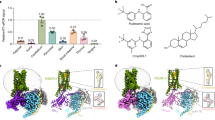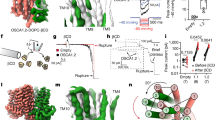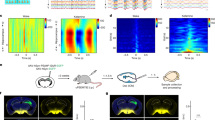Abstract
It is now clear that after a protein meal much of the α-amino nitrogen which is absorbed from the small intestinal tract is transported into the intestinal epithelium across the brush border membrane of the enterocyte in the form of oligopeptides rather than free amino acids1–3. We report here the results of electrophysiological experiments using intracellular micro-electrodes which allow us to add important information concerning the mechanism of membrane transport which must underlie oligopeptide absorption, in particular with respect to the role of Na+ in this peptide transport. Such experiments not only reveal the energetics involved in the major pathway for protein absorption from the gastrointestinal tract but may also be important for understanding the mechanism of action of small peptides in quite different cells, such as the Na+-sensitive binding of the neurohormone oligopeptide enkephalin to the enkephalin receptors in the central nervous system4,5.
This is a preview of subscription content, access via your institution
Access options
Subscribe to this journal
Receive 51 print issues and online access
$199.00 per year
only $3.90 per issue
Buy this article
- Purchase on Springer Link
- Instant access to full article PDF
Prices may be subject to local taxes which are calculated during checkout
Similar content being viewed by others
References
Matthews, D. M. Physiol. Rev. 55, 537–608 (1975).
Ciba Fdn Symp. 50, (1977).
Gardner, M. L. G. J. Physiol., Lond. 253, 233–256 (1975).
Snyder, S. H. Scient. Am. 236, 44–56 (1977).
Miller, R. J., Chang, K. H. & Custrecasas, P. in Centrally Acting Peptides (ed. Hughes, J.) 195–213 (Macmillan, London, 1978).
Boyd, C. A. R. & Ward, M. R. J. Physiol., Lond. 285, 46P (1978).
Garcia-Diaz, J. F., O'Doherty, J. & Armstrong, W. McD. Physiologist 21, 41 (1978).
Rose, R. C. & Schultz, S. G. J. gen. Physiol. 57, 639–663 (1971).
White, J. F. & Armstrong, W. McD. Am. J. Physiol. 221, 194–201 (1971).
Parsons, D. S. Ciba Fdn Symp. 50, 373–376 (1977).
Matthews, D. M., Addison, J. M. & Burston, D. Clin. Sci. 46, 693–705 (1974).
Cheeseman, C. I. & Parsons, D. S. Biochim. biophys. Acta 373, 523–526 (1974).
Cheeseman, C. I. & Parsons, D. S. J. Physiol., Lond. 262, 459–476 (1976).
Hansen, U-P. and Slayman, C. L. in Membrane Transport Processes Vol. 1 (ed. Hoffman, J. F.) 141–154 (Raven, New York, 1978).
Philo, R. D. & Eddy, A. A. Biochem. J. 174, 801–810 (1978).
Boyd, C. A. R. J. theor. Biol. 76, 415–417 (1979).
Author information
Authors and Affiliations
Rights and permissions
About this article
Cite this article
Ward, M., Boyd, C. Intracellular study of ionic events underlying intestinal membrane transport of oligopeptides. Nature 287, 157–158 (1980). https://doi.org/10.1038/287157a0
Received:
Accepted:
Issue Date:
DOI: https://doi.org/10.1038/287157a0
This article is cited by
-
The mode of action of methotrexate‐monoclonal antibody conjugates
Immunology & Cell Biology (1987)
-
l-Alanine andl-phenylalanine activate Na+ and K+ conductance pathways in the exocrine mouse pancreas
Pfl�gers Archiv European Journal of Physiology (1984)
Comments
By submitting a comment you agree to abide by our Terms and Community Guidelines. If you find something abusive or that does not comply with our terms or guidelines please flag it as inappropriate.



